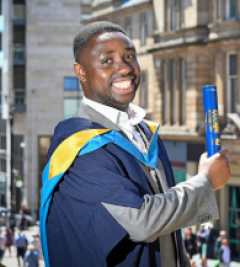Genuine Mwasha

Orphans, street children and Tanzania’s poorest are being fed and offered educational opportunities, thanks to an Open University (OU) graduate’s charity.
Genuine Mwasha was inspired to start Scottish registered charity The Roof of Africa two years into his Bachelor of Law (Honours) degree.
The university safeguarding officer, himself abandoned and living between children’s homes and the streets of Tanzania from the age of two, “studied to further my career and pursue my goal of ensuring justice for all especially the poor”.
With the OU removing the barrier to higher education, Genuine’s confidence was fuelled by his studies – and “the art of the possible” instilled in him by a tutor “with her stories of law and the legal profession” - and he set up his charity.
“The Roof of Africa provides two meals a day to the children from the poorest families and provides food parcels and financial support to families so they can stay with their children,” Genuine says.
“We are also providing sanitation and water projects to these families; this helps unlock these children's futures, end poverty and enable child reunification into their own families where possible, and where not, we are finding them a safer family.”
Over 120 children receive free education at the charity’s school, located near the foothills of Mount Kilimanjaro, and The Roof of Africa is committed to building schools across Sub-Saharan Africa.
Funded degree studies
Genuine, whose grandfather-in-law was an OU graduate and former OU tutor, chose the university for its “freedom to study from anywhere while working a full-time job and raising my children”.
It improved everything at my work; the ability to think like a lawyer is helping me glide through my duties and responsibilities with precision.”
His degree was funded by a Part-Time Fee Grant, and Genuine – who is in his thirties and lives in Edinburgh - was able to apply learnings to his day job as he progressed.
“It improved everything at my work; the ability to think like a lawyer is helping me glide through my duties and responsibilities with precision,” he says.
“My studies are benefiting me greatly as I have a set of skills that helps looking at the issues relating to law, and troubleshoot it better by applying problem-solving skills.”
In future, Genuine would like to be a privacy and cyber security law expert because he believes that the fight for human rights in the twenty-first century and beyond will take place in cyberspace, and he will have the opportunity to make a positive contribution to humanity in that field.
While at secondary school, Genuine had Malaria. Once recovered, his education was halted due to increased cost and a critical water shortage. During a subsequent international home-schooling course at the orphanage where he stayed, he was taught by a family from England.
Later they sponsored Genuine’s studies and he worked for an international charity in Tanzania with their son. Genuine went on to set up a tour and safari business and a barbershop.
OU student community
Genuine met his wife Freda from the Scottish Highlands – who is now one of Roof of Africa’s trustees – when she was volunteering for humanitarian charity First Aid Africa, and they moved to the UK in 2013.
I feel a tremendous sense of gratitude and freedom and that the future is just getting started - you could say I feel unstoppable.”
The dad-of-four felt part of the OU student community as he worked towards his degree: “This helped a lot during the last two modules which we did during the pandemic, such as mediation, which had different online forums for the subject.”
And his advice to anyone about to start an OU course is: “Go for it, the OU is the best place to be and study regardless of what your background is or was.”
Achieving his qualification, Genuine says: “I feel a tremendous sense of gratitude and freedom and that the future is just getting started - you could say I feel unstoppable.
“My law degree from The Open University has empowered me to fight poverty and injustice, and this is critical for my charity, The Roof of Africa, in pursuant to its mission and objectives.”
Photo by Julie Howden
This article was originally published on the OU in Scotland website.